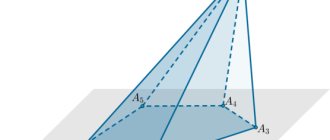Teacher's speech at the first parent-teacher meeting material (grade 1)
TEACHER'S SPEECH AT THE FIRST PARENT MEETING
“THE CHILD GOES TO FIRST GRADE”
Psychological support during school is an important and big problem. We talk a lot about the child’s psychological readiness for school, pushing aside or taking for granted the factor of parents’ readiness for the new, school stage of their child’s life.
The main concern of parents is maintaining and developing the desire to learn and learn new things. For example, you greet your child after school with the question: “What was interesting at school?” “Nothing interesting,” he answers. “It doesn’t happen that way. You learned something new, you were surprised by something, something amazed you.” The child tenses up, remembers what was interesting, and maybe not right away, but he will remember some episode of the lesson or read in the textbook, or maybe he will describe a funny scene that happened during recess.
Your participation and interest will have a positive impact on the development of the child’s cognitive abilities. And you can also unobtrusively guide and strengthen these abilities in the future.
Restrain yourself and do not scold the school and teachers in the presence of your child. Leveling their role will not allow him to experience the joy of knowledge.
Do not compare your child with your classmates, no matter how much you like them or vice versa. You love your child for who he is and accept him for who he is, so respect his individuality.
Be consistent in your demands. If you strive, for example, for a child to grow up independently, do not rush to offer him help, let him feel like he has matured.
Be understanding that your child will not be able to do something right away, even if it seems elementary to you. Be patient. Remember that statements like: “Well, how many times do you need to repeat? When will you finally learn? Why are you so incompetent?” - except for irritation on both sides, they will not cause anything.
One mother compared her child’s first year of school with the first year after his birth: enormous responsibility for him, the need to spend a lot of time with him, an ocean of endurance and patience. This is a truly serious test for parents - a test of their resilience, kindness, and sensitivity.
It’s good if the child feels supported during the difficult first year of school. Your faith in success and a calm, even attitude will help your child cope with all difficulties.
Psychologically, parents must be prepared not only for difficulties and failures, but also for the child’s successes.
It often happens that when we praise a child, we seem to be afraid that he will become arrogant or lazy, and we add a fly in the ointment: “What did Anton get? Five? Well done! In my opinion, he hasn’t received a single B yet!” (implicitly: and you supposedly have B’s too...)
Instead of these statements, it would be much better to simply rejoice at the success that was expected and natural, because it was preceded by work. And it will continue to be the same, you just need to try.
It is very important that parents balance their expectations for the child’s future success with his or her capabilities. This determines the development of the child’s ability to independently calculate his strength when planning any activity.
So, your support, faith in the child, in his success will help him overcome all obstacles.
REMINDER FOR PARENTS
At 6–7 years old, brain mechanisms are formed that allow a child to be successful in learning. Doctors believe that at this time the child has a very difficult time with himself. And our great-grandmothers were right a thousand times, who sent their offspring to gymnasium only at the age of 9, when the nervous system was already formed.
However, serious breakdowns and illnesses can be avoided even today if you follow the simplest rules.
Rule 1.
Never send your child to first grade and some section or club at the same time. The very start of school life is considered severe stress for 6-7 year old children. If the baby does not have the opportunity to walk, relax, and do homework without haste, he may develop health problems and neurosis may begin. Therefore, if music and sports seem to be a necessary part of your child's upbringing, start taking him there a year before the start of school or in second grade.
Rule 2.
Remember that a child can concentrate attention for no more than 10–15 minutes. Therefore, when you do homework with him, you need to stop every 10-15 minutes and be sure to give your baby physical relaxation. You can simply ask him to jump in place 10 times, run or dance to music for a few minutes. It is better to start doing homework with writing. You can alternate written tasks with oral ones. The total duration of classes should not exceed one hour.
Rule 3.
Computer, TV and any activities that require a lot of visual stress should last no more than an hour a day - this is what ophthalmologists and neurologists in all countries of the world believe.
Rule 4.
More than anything else, your baby needs support during the first year of school. He not only forms his relationships with classmates and teachers, but also for the first time understands that some people want to be friends with him, and others do not. It is at this time that the baby develops his own view of himself. And if you want him to grow into a calm and confident person, be sure to praise him. Support, do not scold for bad marks and dirt in the notebook. All these are small things compared to the fact that your child will lose faith in himself from endless reproaches and punishments.
A few short rules
- Show your child that he is loved for who he is, and not for his achievements.
- You should never (even in your hearts) tell a child that he is worse than others.
— You should answer any questions from your child as honestly and patiently as possible.
— Try to find time every day to be alone with your child.
— Teach your child to communicate freely and naturally not only with his peers, but also with adults.
- Don’t be shy to emphasize that you are proud of him.
- Be honest in your assessment of your feelings for your child.
- Always tell your child the truth, even when it is not beneficial for you.
- Evaluate only the actions, not the child himself.
- Don't achieve success by force. Coercion is the worst version of moral education. Coercion in the family creates an atmosphere of destruction of the child’s personality.
— Recognize the child’s right to make mistakes.
— Think about a childhood bank of happy memories.
— The child treats himself the way adults treat him.
- And in general, at least sometimes put yourself in the place of your child, and then it will be clearer how to behave with him.
Speech by a subject teacher at a parent meeting The role of parents in improving quality
Serobabova A.A.
teacher of Russian language
The role of parents in improving the quality of students' knowledge
1. Requirements for the number of notebooks
2. The role of notebooks in learning
3. Necessity and benefits of TVET
4. The role of parents
5. Problems with keeping notebooks
I will try to explain to you, dear parents, how important it is for children to work in notebooks and how important it is that you pay special attention to this and understand what the teacher wants from your children.
1. To work in Russian language lessons, children in grades 5-9 must have 2 notebooks on the Russian language, 1 for tests and 1 for creative work: a total of 4 notebooks. In addition, at the discretion of the teacher, parents purchase printed notebooks (TPO) for the subject. Everyone in my classes has such notebooks. I did this because it was important for me that everyone had them from the very beginning of the year (I know that some teachers have problems with this).
(slide 1) They are called “Comprehensive text analysis” for all classes of one author and publisher.
2. Working in these notebooks is very important in order to prepare children for the exam. These notebooks are used in grades 6, 7 and 10. How is this notebook related to the exam?
(slide 2) To answer this question you need to have an idea of what structure the final certification work has. The fact is that modern examination work is very noticeably different from examination work 8-10 years ago. In the 9th grade, in the GIA form, it consists of 3 parts: writing a statement, answering test questions and writing an argumentative essay. It lasts for 4 hours. Its implementation does not cause serious difficulties for children who have studied diligently during 9 years of study. BUT it is quite complicated if during the course of study from grades 1 to 9 the child did not learn anything special or studied superficially, i.e. learned, told and forgot (in this case, the child’s goal of learning is the assessment itself, and not knowledge).
It is IMPOSSIBLE to learn to pass an exam in the Unified State Exam format in one year of study in 9th grade. Since only two hours a week are given to study the Russian language in the 9th grade (i.e., 2 lessons), the conduct of which is designed to complete the study of the Russian language (i.e., each lesson is planned and only for repetition at the beginning of the year only a few lessons are given). There is no time to prepare for exams in class; for this there are elective courses, electives and consultations on preparing for the exam, which our children attend under pressure, and some children do not attend at all.
4. Parents of children who are not studying in the 9th or 11th grade probably thought, “What’s more, the exam is still 2-3 years away.” Quite recently, one student told me “Why do I need this Russian language, it will not be useful to me anywhere in my life.” My answer to children is that knowledge of the Russian language is necessary at least in order to pass the exam and graduate from school. But I understand that parents should explain to children why they need to study. So, the purpose of attending Russian language lessons for children should be to prepare for the exam starting in grades 5 and 6. “If you don’t study, you won’t be able to pass the exam” - these are the words you should tell your children. Most of them don't understand why they go to school. This is the biggest problem that only parents can solve.
(slide 2) 3. Let's go back to our TVET, with which children work already in the 6th and 7th grade. The notebook you see is very useful for preparing for the exam, and for all three of its parts (the essay, the presentation, and the test). The entire examination work is based on the ability to work with text: analyze it (answering test questions), be able to reproduce someone else’s text (when writing an exposition), and compose your own text (when writing an essay).
(slide 3) The range of tasks offered by the author of this notebook develops in children the skills and abilities necessary to successfully pass the exam: draw up a text outline, determine its style and type of speech, determine the topic and main idea of the text, do phonetic, morphological, word-formation word parsing. Also, for each text, a task is given, which implies a detailed answer to the question (this is preparation for part C). You can receive multiple grades for working with one text. In general, a wonderful notebook that helps prepare for the exam (for those children who have such a goal, it does not help the rest).
Some tasks are aimed at developing the ability to work with dictionaries. This skill is also very important, because... The only thing children are allowed to use during the exam is a spelling dictionary, which is on the children’s desk from the very beginning of the exam. But experience shows that if it is possible to check every word (there is time and means), rarely does anyone do this.
Another advantage of this notebook is the availability of reference material. In which definitions are given that allow you to understand the tasks and complete them correctly.
Moreover, we will use such notebooks throughout all years of study, and this will allow your children to prepare for the exam gradually, and not urgently in the 9th grade, when it is too late to change anything.
5. And now I would like to tell you what problems I personally have with working with notebooks as a teacher, but I think I will not be mistaken if I say that most teachers experience the same problems. Moreover, I would like to address the questions that I have to your parents, because the parents’ attitude towards the child’s notebooks directly affects his or her academic performance.
In our time, parents forced any comment in the notebook to be corrected, since it was perceived as a shortcoming of the student and his parent (it was shameful).
(slide 4) Now everything is completely different. Pay attention to the slide (this is not just one, there are three of them at home - the load is feasible). I believe that there should be a reaction to something like this in the notebook, and first of all the reaction of the parent, but there is none. No, because in the same notebook there is something like this. Why do you think? Either the parent does not see the child’s notebooks, or believes that the teacher’s comments are unfounded (he is finding fault). I really want, I dream that all my children know Russian at 4 and 5. This would be the best reward for the effort that you have to invest. And my bosses don’t praise me for bad grades. But, unfortunately, we have to give different estimates.
(slide 5) I very often observe a picture where there is regularly no reaction to such entries in children’s notebooks. What do I expect in such a situation? At a minimum, there should be work to correct mistakes or a task completed correctly; the child should do this independently or with the help of a teacher or parent.
There are children who zealously refuse to complete the task in full: they copy the exercise and do not complete the tasks for it. Why do I pay so much attention to this? When taking an exam, it doesn’t matter whether you know how to copy a text, what matters is whether you know how to work with it. Moreover, correctly understanding what you are asked about is 50% of success. There are many examples when children know the rule, know how to use it, but do not know how to follow the instructions and formulate the answer incorrectly, and in the end it turns out to be incorrect. Therefore, it is important to correctly understand the task and be able to answer it correctly; this also needs to be learned.
And when I make comments like these, I want the child to carefully read the task and complete it correctly. I can force a child to stay after school, and until recently I did this, but this experience allowed me to understand that there will be no result if I force it. The desire to change something must come from the child himself, then there will be results. You cannot force knowledge into a student’s head. I feel powerless when I try to give knowledge to a child, but he doesn’t take it, he doesn’t need it.
It is very important that the child understands why he is receiving a grade, sees the result of his efforts and can compare. What am I doing to make the assessment system transparent and understandable to children? First of all, most of the grades that children receive in the Russian language are grades for written work (vocabulary, terminological dictation, k/r, test, s/r, p/r, presentation, essay). (slide 6) In addition, we develop evaluation criteria with the children together (you can ask) for an example on the slide (for a test of 10 questions or a dictation of 10 words). We do this before we start work (voice the slide).
(slide) In grades 6 and 7 there is also a notebook for assessing the quality of knowledge, which children do not take home, I keep it, you can look at it if you want. Which is also understandable from the point of view of how the work is assessed; I spend a lot of time on this in class, telling the children how I assessed it. I'll show you with an example. The ability to follow instructions is also developed thanks to this notebook.
An important point regarding absences from classes, whether there is a good reason or not. The child must study the topic and complete tasks that were completed without him. If this is not done, a knowledge gap will form in the child’s head. What if you add up such gaps in knowledge over 9 years? And this takes into account the fact that the school education system is structured in such a way that the knowledge given to children becomes more complex and is added to what they already have. And if they are not there because a lot has been missed.
In the workbooks, next to the tasks that we have already completed, I put the number when it was done or the question “?” (means it needs to be done). The problem here is that children react negatively to such a system; for them, missing school is an extra day during the holidays. After which they come and calmly answer, “I wasn’t there when you went through this.” In response to this, I’m already tired of giving them an example, when in two years they come to the exam, what will they say if they don’t know, “I wasn’t there when you took it, I was sick.” Who is interested in this answer?
We need to talk about this with children and parents. You control your child, you allow and forbid him something, and by your serious or permissive attitude towards the child’s studies, you shape his attitude.
During the exam, children still expect outside help, blame teachers who refuse to help, and parents, adults, for some reason agree with them. It is not the teacher’s fault that there are children who fail. Water does not flow under a lying stone. Nobody asks you to teach your child, to do his homework for him, for this there is a teacher who waits for your child every day until 5 o’clock and is ready to help him. But it is IMPOSSIBLE to teach something to someone who is not going to study, but his parents allowed him to do so.
It is the parent’s responsibility to explain why he needs it, to help, to control, if he needs to force it. And this is work, serious daily work with your child, which, unfortunately, most parents do not do. That is why we are seeing such disastrous results.
Photos of notebooks: where there are a lot of comments, where there are several questions, a schedule, no assignments.
«
»







